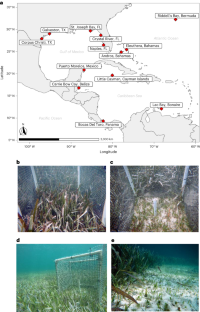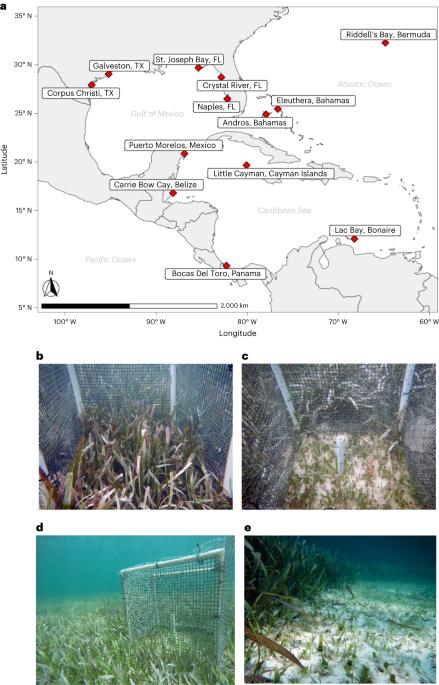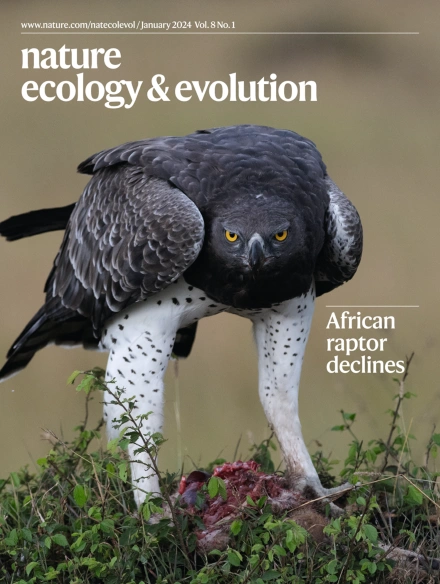Herbivore effects increase with latitude across the extent of a foundational seagrass
IF 13.9
1区 生物学
Q1 ECOLOGY
引用次数: 0
Abstract
Climate change is altering the functioning of foundational ecosystems. While the direct effects of warming are expected to influence individual species, the indirect effects of warming on species interactions remain poorly understood. In marine systems, as tropical herbivores undergo poleward range expansion, they may change food web structure and alter the functioning of key habitats. While this process (‘tropicalization’) has been documented within declining kelp forests, we have a limited understanding of how this process might unfold across other systems. Here we use a network of sites spanning 23° of latitude to explore the effects of increased herbivory (simulated via leaf clipping) on the structure of a foundational marine plant (turtlegrass). By working across its geographic range, we also show how gradients in light, temperature and nutrients modified plant responses. We found that turtlegrass near its northern boundary was increasingly affected (reduced productivity) by herbivory and that this response was driven by latitudinal gradients in light (low insolation at high latitudes). By contrast, low-latitude meadows tolerated herbivory due to high insolation which enhanced plant carbohydrates. We show that as herbivores undergo range expansion, turtlegrass meadows at their northern limit display reduced resilience and may be under threat of ecological collapse. Conducting a simulated turtlegrass herbivory experiment across 650 experimental plots and 13 seagrass meadows, the authors show that the negative effects of herbivory increase with latitude, driven by low levels of light insolation at high latitudes.


食草动物对基础海草的影响随纬度的增加而增加
气候变化正在改变基础生态系统的功能。虽然气候变暖的直接影响预计会影响单个物种,但人们对气候变暖对物种相互作用的间接影响仍然知之甚少。在海洋系统中,随着热带食草动物向极地扩展,它们可能会改变食物网结构,并改变主要栖息地的功能。虽然这一过程("热带化")在衰退的海藻森林中已有记录,但我们对这一过程如何在其他系统中展开的了解还很有限。在这里,我们利用一个横跨 23° 纬度的地点网络来探索草食性增加(通过剪叶模拟)对基础海洋植物(海龟草)结构的影响。通过跨越其地理范围,我们还展示了光照、温度和养分的梯度如何改变植物的反应。我们发现,龟背竹在其北部边界附近越来越受到草食动物的影响(生产力下降),而这种反应是由光照的纬度梯度(高纬度地区日照低)驱动的。与此相反,低纬度草地由于日照高,植物碳水化合物含量增加,因而能够承受食草动物的侵害。我们的研究表明,随着食草动物的分布范围不断扩大,龟背竹草甸在其北部极限地区的恢复能力下降,可能面临生态崩溃的威胁。
本文章由计算机程序翻译,如有差异,请以英文原文为准。
求助全文
约1分钟内获得全文
求助全文
来源期刊

Nature ecology & evolution
Agricultural and Biological Sciences-Ecology, Evolution, Behavior and Systematics
CiteScore
22.20
自引率
2.40%
发文量
282
期刊介绍:
Nature Ecology & Evolution is interested in the full spectrum of ecological and evolutionary biology, encompassing approaches at the molecular, organismal, population, community and ecosystem levels, as well as relevant parts of the social sciences. Nature Ecology & Evolution provides a place where all researchers and policymakers interested in all aspects of life's diversity can come together to learn about the most accomplished and significant advances in the field and to discuss topical issues. An online-only monthly journal, our broad scope ensures that the research published reaches the widest possible audience of scientists.
 求助内容:
求助内容: 应助结果提醒方式:
应助结果提醒方式:


